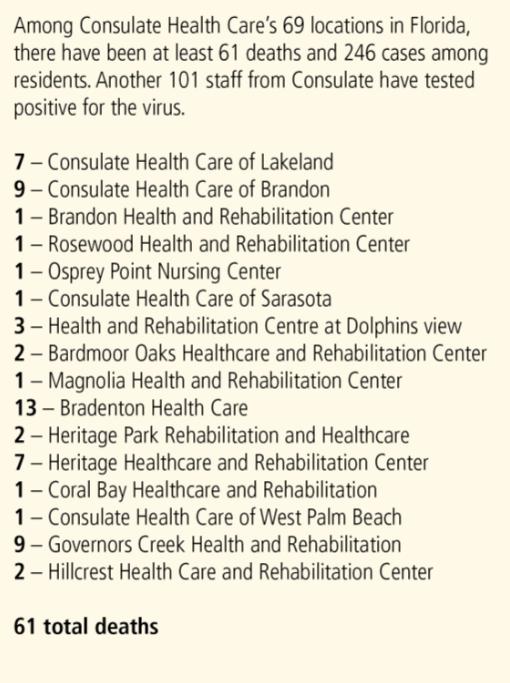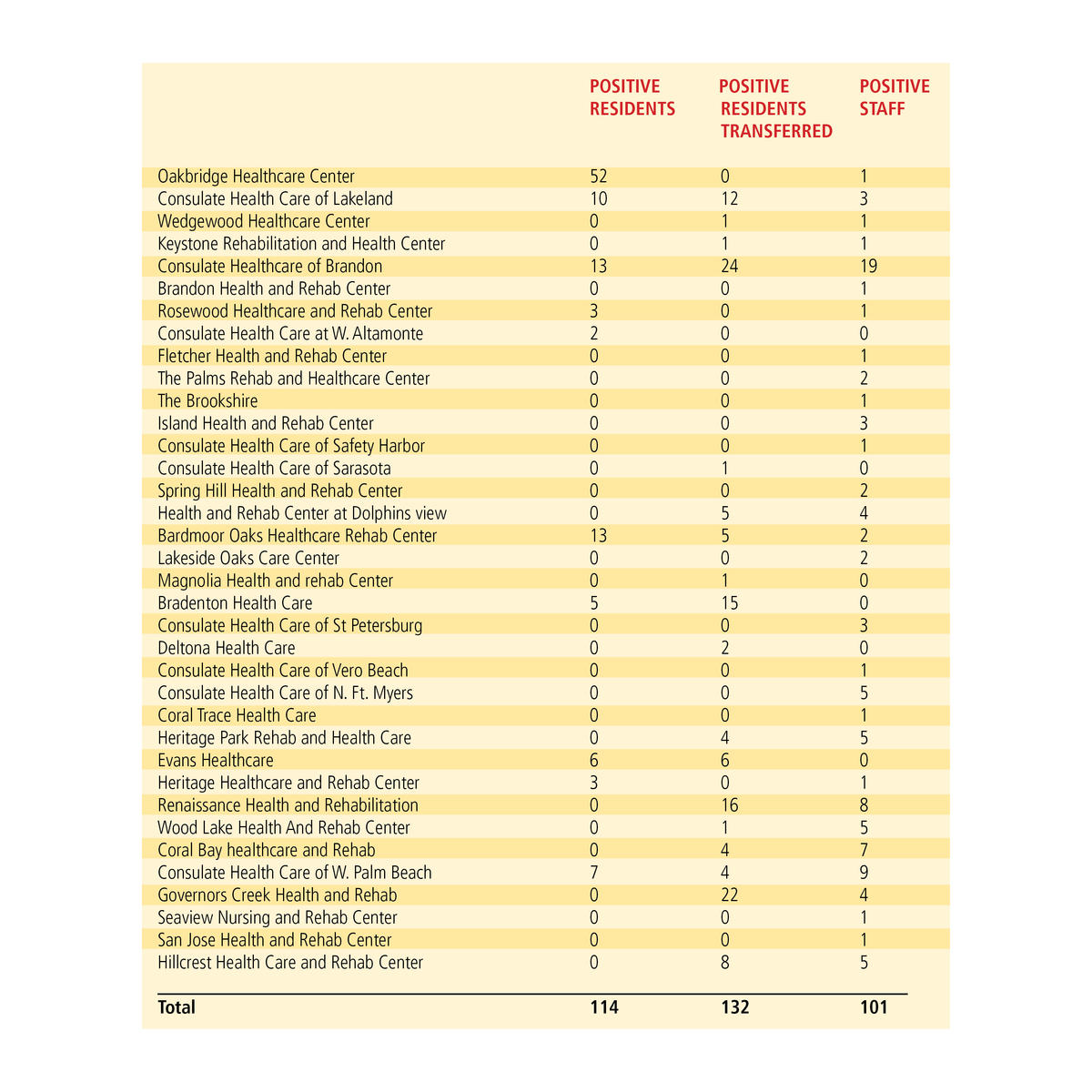WUSF News: By JULIO OCHOA & DAYLINA MILLER • JUN 22, 2020
More than a third of COVID-19 deaths in the United States so far happened at nursing homes.
Now Congress is demanding answers from five of the companies that run them, including one with 69 facilities in Florida.
Consulate Health Care is one of the largest for-profit nursing home chains in the United States. It’s also one of the five that received a letter June 16 from House Majority Whip James Clyburn, who chairs the Select Subcommittee on the Coronavirus Crisis, demanding documents on infection control and virus preparedness.
There have been at least 61 deaths and 246 cases among residents at Consulate Health Care’s 69 locations in Florida, according to data from the state Department of Health.
Another 101 Consulate employees have tested positive for the virus.
Nearly half of the deaths happened at facilities in Brandon, Lakeland, and Bradenton.
Clyburn’s letter outlined what he called the long-term care industry’s “widespread and persistent” pattern of deficiencies that include chronic understaffing, low wages, lack of paid sick leave, improper hand hygiene and poor disease prevention practices – all of which have contributed to the crisis.
A recent Government Accountability Office (GAO) report found “most nursing homes ha[d] an infection prevention and control deficiency cited in one or more years from 2013 through 2017 (13,299 nursing homes, or 82 percent of all surveyed homes)” such as staff who “did not regularly use proper hand hygiene or failed to implement preventive measures during an infection disease outbreak.”
The report warned, “Many of these practices can be critical to preventing the spread of infectious diseases, including COVID-19.”
Clyburn’s letter also says a Centers for Medicare & Medicaid Services inspection found that some nursing homes had severe deficiencies in infection control that placed residents’ health and safety in “immediate jeopardy,” including staff members who failed to wash their hands, wear masks, or follow isolation protocols.
The letter asks Consulate to provide a variety of documents to the task force by June 30, covering January 1, 2020 to the present.
These include records on the number of beds; how those beds are paid for; demographic information of residents; wages and paid time off for employees; a breakdown of available personal protective equipment and its use; suspected number of coronavirus infections and deaths; and complaints made about the company.
Similar letters with the same demands were sent to chief executive officers of Genesis HealthCare, Life Care Centers of America, Ensign Group, and SavaSeniorCareSava.
On Monday afternoon, U.S. Rep. Ted Deutch, D-Fla., and other members of the House Democratic Caucus Task Force on Aging and Families held an online roundtable discussion on Facebook about the impact of COVID-19 on nursing homes.
Deutch stressed that just because the recent rise in Florida cases appears to be residents in their 20s and 30s, doesn’t mean the work to protect the elderly is over.
“We can’t give up preventing outbreaks because it’s mostly younger people, as the governor pointed out, and expect Floridians and nursing homes will be okay because they’re locked away. That’s not acceptable. It’s not what aging in America should look like.”
Deutch said in the 100 days since Gov. Ron DeSantis ordered nursing homes to close to visitors, the state has failed to come up with a long-term, comprehensive plan for the virus.
“Instead, he blamed farmworkers with racially charged rhetoric; he blamed young people. He blamed the media. And it is the most vulnerable Floridians who are paying the price,” Deutch said. “Residents and staff at long-term care facilities account for more than half of the reported deaths in our state.”
 TAMPA—Dozens of long-term care workers and members of the state’s largest healthcare union, 1199SEIU United Healthcare Workers East, held a vigil in Tampa recently to mourn the deaths of more than 1,500 nursing home patients and caregivers – as well as all victims – related to the Covid-19 coronavirus, and to protest the lack of leadership during the crisis from Florida Senators Marco Rubio and Rick Scott.
TAMPA—Dozens of long-term care workers and members of the state’s largest healthcare union, 1199SEIU United Healthcare Workers East, held a vigil in Tampa recently to mourn the deaths of more than 1,500 nursing home patients and caregivers – as well as all victims – related to the Covid-19 coronavirus, and to protest the lack of leadership during the crisis from Florida Senators Marco Rubio and Rick Scott.




 The budget cuts to bedside care in Florida’s nursing homes, passed last year, have impacted thousands of nursing homes residents and nursing home workers. Staffing levels were reduced from a minimum weekly average of 2.9 hours of care per resident per day to 2.5 hours, which shortens the amount of time caregivers spend with residents by 18 minutes per day.
The budget cuts to bedside care in Florida’s nursing homes, passed last year, have impacted thousands of nursing homes residents and nursing home workers. Staffing levels were reduced from a minimum weekly average of 2.9 hours of care per resident per day to 2.5 hours, which shortens the amount of time caregivers spend with residents by 18 minutes per day.